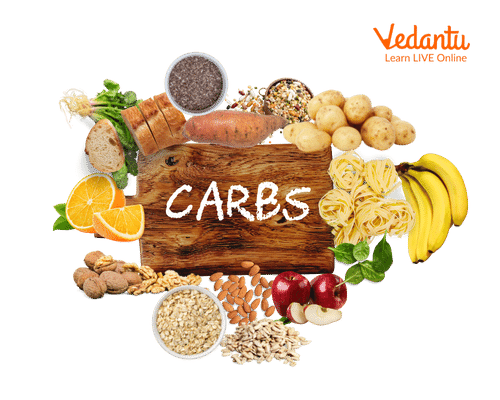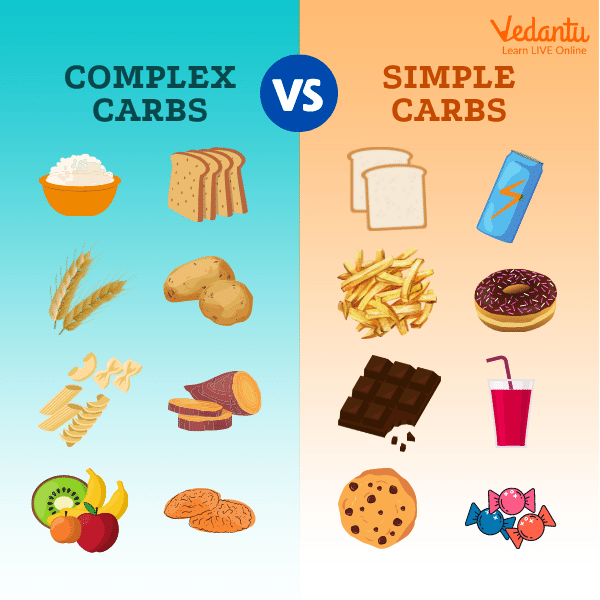




Why Are Carbohydrates Important for Our Health and Energy?
Nutrients are substances that in their simplest form are absorbed by the blood to help an organism survive, grow and perform life-essential functions. We get nutrients from the food we consume. They are used by cells to create or nourish non-cellular structures such as our hair.
Carbohydrates are the nutrients that provide us with energy. Do you know what food contains Carbohydrates? Carbohydrates are found in foods such as pasta, bread, rotis, rice, etc. There are 5 main groups of nutrients - Proteins, Fats, Carbohydrates, Vitamins, and Minerals. In this article, we will be talking about carbohydrates and their importance.

Carbohydrates
What are Carbohydrates?
Carbohydrates are essentially sugar (sacarride) molecules chemically bound together. Once broken down most carbs are reduced to a simple sugar known as glucose. Contrary to popular belief, it is not the number of carbohydrates consumed but the quality of carbs consumed that matters. Thus, the source from which the body receives carbs is important. Healthy whole food such as grains are better and healthier sources of carbohydrates as compared to refined white bread, or chips.
Carbohydrates are important for our body as they provide us with energy to perform physical activities and various body funcion. Carbohydrates also help us grow. They are as important to us as fuel to vehicles.
Glucose
It is one of the simplest forms of carbohydrates obtained when they are broken down. It can be directly absorbed into the bloodstream. The absorption of glucose into the bloodstream causes the brain to send a signal to the pancreas to release a chemical called insulin. This chemical helps glucose to enter the cells, where it is converted into a chemical compound called ATP to provide the body with energy.
Categories of Carbohydrates
There are two broad categories of carbs - Sugars and Starches
Sugars are simpler carbohydrates and are easy to break down. They consist of Monosaccharides (One simple sugar molecule) or Disaccharides (two simple sugar molecules chemically bound together)
Sugars are most commonly found in sweet foods such as chocolates, juices, etc. Thus, sugars have a sweet taste.
They act as a direct source of energy.
Starches are complex carbohydrates that have to go through multiple steps to be broken down into absorbable forms. They consist of polysaccharides (multiple monosaccharides joined together).
Starches are more commonly found in grains, pasta, etc. Unlike sugars, they do not have a sweet taste even though they are made by multiple sugar molecules joining together.
They often form the storage source of energy in the human body.

Complex vs Simple Carbs
5 Interesting Facts About Carbohydrates
Here are some fun facts about carbohydrates for you to read and learn.
They are made up of a chemical combination of carbon, hydrogen, and oxygen. Their base chemical formula is (CH2O)n
Simple sugars that contain only 1 molecule are known as monosaccharides
Polysaccharides include more than 2 monosaccharides joined together by chemical bonds.
Sugars are bound together by chemical bonds called glycosidic bonds
Since basic sugars are easier to break down, when sugary food like chocolates are consumed they are digested faster. This causes us to feel hungry also faster.
Since starches such as pasta, grains, etc are harder to break down, they take longer to be digested and make us feel fuller for longer.
Aside from glucose, there exist two other very important monosaccharides. These are
Fructose - broken down form of sugar found in fruits
Galactose - broken down form of sugar found in milk
Extra carbohydrates in the body are stored in the form of a polysaccharide called glycogen.
The cell wall in plants is also made up of a complex carbohydrate called cellulose. Cellulose hardens the cell wall, making it impermeable.
A simple carbohydrate (disaccharide) called Deoxyribose makes up an important part of DNA!
Summary
Carbohydrates are essential nutrients found in food that are broken down into glucose in the body to provide energy. The two broad categories of carbohydrates are sugars (simple carbs) and starches (complex carbs). Parents can encourage their children to learn more about carbohydrates by helping them identify food that are rich in carbohydrates from their daily meals.
FAQs on Carbohydrates Explained: Essential Facts Every Student Should Know
1. What are carbohydrates and why does our body need them?
Carbohydrates are one of the main types of nutrients our bodies use for energy. They are like fuel for a car; they provide the power your brain, muscles, and organs need to function correctly. Without carbohydrates, you would feel tired and weak.
2. What are the different types of carbohydrates?
There are two main types of carbohydrates: simple and complex.
- Simple carbohydrates are sugars, like those found in fruits, milk, and sugary snacks. They provide quick energy.
- Complex carbohydrates are starches and fiber, found in foods like potatoes, bread, rice, and vegetables. They release energy more slowly.
3. What are some examples of healthy and unhealthy carbohydrate foods?
Choosing the right source of carbohydrates is important. Healthy sources include whole foods that provide vitamins and fiber, while unhealthy ones are often processed.
- Healthy carbs: Oats, brown rice, quinoa, apples, bananas, chickpeas, and sweet potatoes.
- Unhealthy carbs: Sugary drinks, white bread, pastries, packaged chips, and candy.
4. What happens to carbohydrates in our body after we eat them?
The digestion of carbohydrates begins in the mouth and finishes in the small intestine. Your body breaks them down into simple sugars, mainly glucose. This glucose enters your bloodstream and is carried to your cells to be used as immediate energy.
5. Why are some carbohydrates called 'good' and others 'bad'?
The terms 'good' and 'bad' refer to how carbohydrates affect our body. Good carbs, like those from vegetables and whole grains, are complex. They release energy slowly and contain fiber and nutrients. Bad carbs, like sugar and white flour, are simple. They cause a rapid spike in blood sugar, offering quick but not lasting energy and few other nutritional benefits.
6. What is the difference between the carbohydrates in a potato and in a can of soda?
A potato is full of complex carbohydrates (starch), which your body digests slowly, providing a steady supply of energy. A can of soda, on the other hand, contains simple carbohydrates (sugar) that are digested very quickly, leading to a sudden energy rush followed by a crash.
7. Do all carbohydrates taste sweet?
No, not all carbohydrates taste sweet. Simple carbohydrates like fructose (in fruit) and sucrose (table sugar) are what we recognize as sweet. However, complex carbohydrates like starch, found in foods such as rice and potatoes, do not have a sweet taste at all.
8. How can we test for the presence of starch in a food item?
You can perform a simple iodine test. When you add a few drops of iodine solution to a food item, it will turn a blue-black colour if it contains starch. This happens because of a chemical reaction between the iodine and the starch molecules. This is a common science experiment to identify this type of carbohydrate.





















